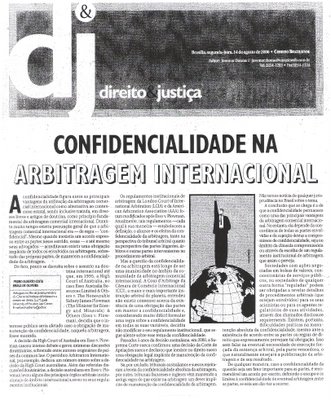Since in my previous posting I wrote about recognition and enforcement of foreign arbitral awards, I would like to comment about something that I have not yet seen addressed anywhere.
Brazil acceded to the
United Nations Convention on the Recognition and Enforcement of Foreign Arbitral Awards (“
New York Convention”) in 2002 (The New York Convention entered into effect in Brazil pursuant to
Decreto nº 4.311, de 23 de julho de 2002). Needless to say, Brazil’s accession to the New York Convention was very well received by Brazilian and foreign practitioners and scholars, for obvious reasons: it was a late —considering that the
Brazilian Arbitration Act was dated September 1996, but a very important— step for the strengthening and further development of arbitration in Brazil.
The procedure for enforcement of foreign arbitral awards in Brazil is identical to the procedure for domestic awards: both are enforceable under provisions of the Brazilian Civil Procedure Code. Before becoming enforceable in Brazil, however, foreign arbitral awards must receive a leave for enforcement —known in the Brazilian legal writing as
exequatur or
homologação— from the
Superior Tribunal de Justiça (“
STJ”), which is the court with exclusive jurisdiction to confirm foreign arbitral awards.
Under Brazilian legal tradition, the application for recognition of a foreign arbitral award is a legal process that precedes enforcement, which is a distinct legal process that must be filed after the STJ has granted the
exequatur to the foreign award (as per the sole paragraph of
Section 34 of the Brazilian Arbitration Act, a foreign arbitral award is an award made outside the Brazilian territory). Domestic awards —those made in the Brazilian territory—, however, don't need to be previously confirmed by any court of law as, in Brazil, domestic awards are final and binding, and not subject to any leave for enforcement or registry by State Courts (
Section 18 of the Brazilian Arbitration Act).
The second part of
Article III of the
New York Convention, which relates to discriminatory treatment between domestic and foreign arbitral awards, states that:
“
There shall not be imposed substantially more onerous conditions or higher fees or charges on the recognition or enforcement of arbitral awards to which this Convention applies than are imposed on the recognition or enforcement of domestic arbitral awards”.
Could the conditions for the recognition and enforcement of foreign arbitral awards in Brazil, be considered more onerous than those imposed to the enforcement of domestic awards, in view of the New York Convention's Article III?
I believe so.
The Brazilian exequatur process increases time and cost to the enforcement of foreign awards in Brazil, because such process consists of separate sessions (hearings) before the STJ, each session taking place months apart from the other. And, once the
exequatur order is finally obtained, the successful party must still file an execution lawsuit to secure enforcement of the award —before the Federal Court of with jurisdiction over the place where enforcement is sought— and this is not also obtainable without further delay.
The practical problems to enforce foreign awards in Brazil, including the applicant’s need to file another procedure to secure enforcement upon the grant of exequatur from the STJ, creates significant cost and time constrains to the applicants. It takes years until a foreign arbitral award is finally enforced in Brazil, counted from the application before the STJ.
Until Brazil passes an amendment to both the Federal Constitution and the Brazilian Arbitration Act to simplify the
exequatur procedure, removing the exclusive jurisdiction of the STJ to that end, the enforcement of foreign arbitral awards —and eventual collection of the defendant's assets, in Brazil— will continue to be time-consuming and costly. The recognition of the foreign arbitral award inside the enforcement process, in the same process —as used in several countries— is the best solution to Brazil.

